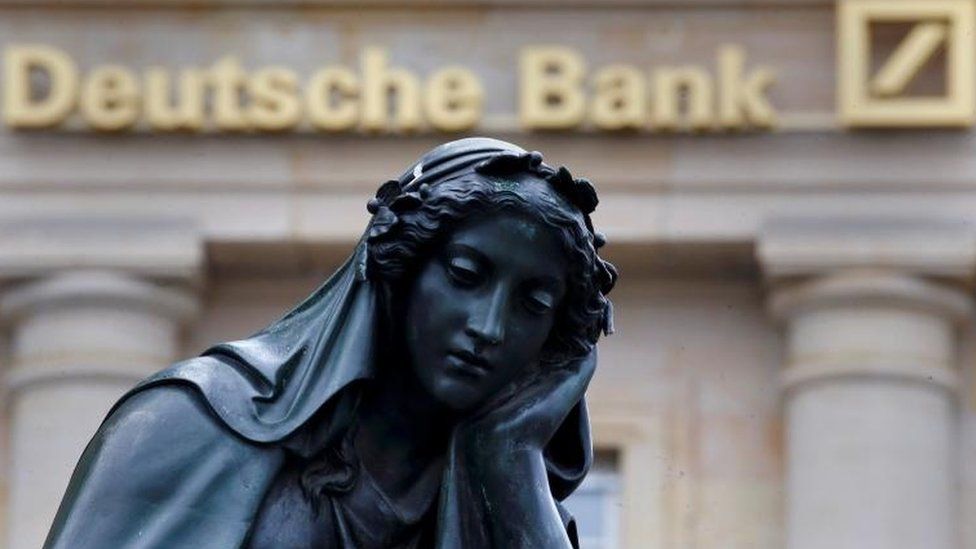Deutsche Bank: World's most dangerous bank?
- Published
- comments

Deutsche Bank shares hit a new record low today. Its value has halved since the beginning of the year.
So is it now the most dangerous bank in the world?
According to the International Monetary Fund - yes.
Last week, the IMF said that, of the banks big enough to bring the financial system crashing down, Deutsche Bank was the riskiest. Not only that, Deutsche Bank's US unit was one of only two of 33 big banks to fail tests of financial strength set by the US central bank earlier this year.
It's not hard to get scared when you look at a few numbers. Bear with me.
In simple terms any bank is worth the difference between what it's owed and what it owes. In the case of Deutsche Bank that means the difference between assets of 1.64 trillion euros (yes, trillion) and liabilities of 1.58 trillion euros. Its net value is 60 billion euros.
Sounds like a lot. BUT the value of what its owed doesn't need to move by much to wipe out its value completely.
'Financial apocalypse'
The IMF and the US central bank aren't the only ones who think Deutsche Bank is risky. The share price has fallen early 70% in the last year. In fact, you can buy the whole bank for 20bn euros - a third of what it's worth on paper. Other banks trade at a discount to their net worth but Deutsche Bank is by far the biggest.
For that reason, many people fear Deutsche Bank could be the first horseman of a new financial apocalypse.
This is a strange position for the one-time financial muscleman of European banking to find itself in. There are few German companies more associated with the post-war economic miracle than Deutsche Bank. Long before the European Central Bank existed, it worked hand in glove with the seemingly infallible Bundesbank to provide rock solid non-inflationary growth for decades.
It went truly global in the 1990s when it took the fight to the big US investment banks like JP Morgan and Goldman Sachs and was "around the hoop" (a US basketball metaphor beloved by investment bankers) wherever big deals were being done.
That in a way is part of the bank's problem. Deutsche Bank, the parent company, is considered reasonably solid by the odd rules of banking regulation.
The key score of a bank is its capital ratio. (I won't bore you with this but it's a calculation that divides the bank's own money (capital), plus anything you can convert into capital, by your assets, adjusted for how risky they are).
The bare minimum is 7%. Deutsche Bank scores 11% - not great, but not terrible. Roughly the same as Barclays. The problem with Deutsche is that it doesn't have big retail banking and credit card businesses (both seen as reasonably safe and boring) to balance its bigger and riskier investment banking operations.
'Rock solid'
There are two people standing in the way of Deutsche Bank and panic. The first is the current chief executive John Cryan. He is no swashbuckling Fred Goodwin (RBS) or Bob Diamond (Barclays) of pre-crisis notoriety. He is a very conservative, feet on the ground pragmatist. He's already managed to reduce the debt of the bank and has plans to do more.
The other is even more important. German Finance Minister Wolfgang Schaeuble. He has said this year that he considers Deutsche Bank "rock solid".
That is not only reassuring in itself, but indicates there is no way on earth that a rich German government would let the most important bank in Germany - and by extension Europe - come to any harm.
At the time of writing, the Italian government is considering ignoring state aid rules to shore up its own fragile banks. If there was a similar need in Germany, you can be sure, say my banking sources, that Germany would do the same.
Just to be clear - we are nowhere near that point now. However, as we learnt in the crisis of 2008, when governments do get involved investors can end up with next to nothing and that is why the shares are so cheap.